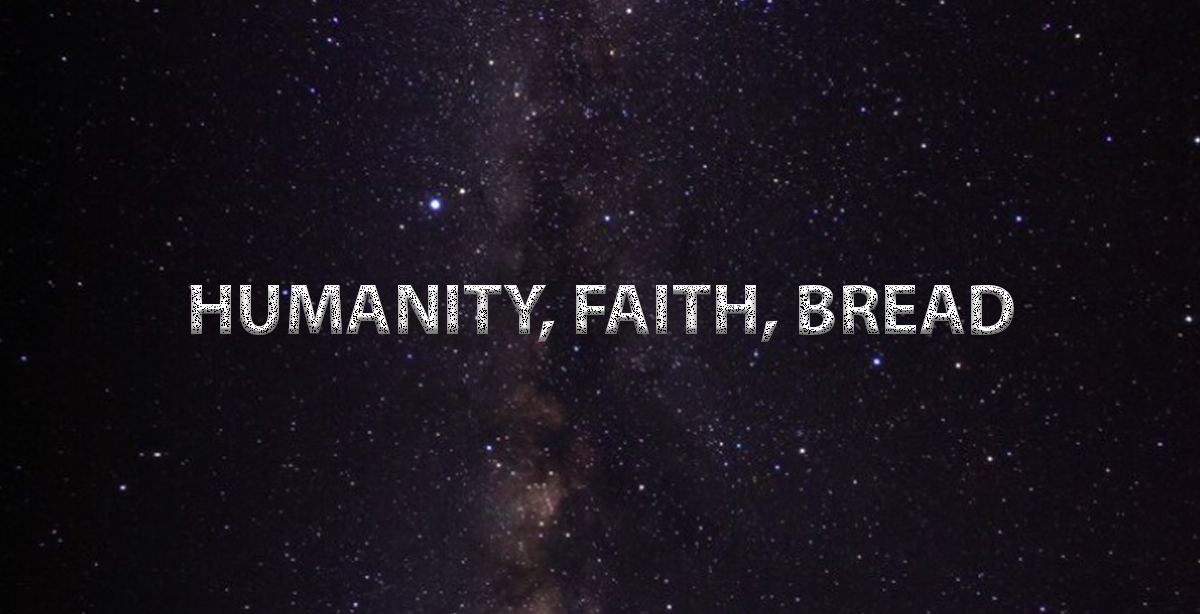Opening Prayer
‘Let me seek you in my desiring, let me desire you in my seeking. Let me find you by loving you, let me love you when I find you’ (Anselm of Aosta).
Read MARK 8:1–13
For additional translations of the passage, use this link to Bible Gateway.
Jesus Feeds the Four Thousand
8 During those days another large crowd gathered. Since they had nothing to eat, Jesus called his disciples to him and said, 2 “I have compassion for these people; they have already been with me three days and have nothing to eat. 3 If I send them home hungry, they will collapse on the way, because some of them have come a long distance.”
4 His disciples answered, “But where in this remote place can anyone get enough bread to feed them?”
5 “How many loaves do you have?” Jesus asked.
“Seven,” they replied.
6 He told the crowd to sit down on the ground. When he had taken the seven loaves and given thanks, he broke them and gave them to his disciples to distribute to the people, and they did so. 7 They had a few small fish as well; he gave thanks for them also and told the disciples to distribute them. 8 The people ate and were satisfied. Afterward the disciples picked up seven basketfuls of broken pieces that were left over. 9 About four thousand were present. After he had sent them away, 10 he got into the boat with his disciples and went to the region of Dalmanutha.
11 The Pharisees came and began to question Jesus. To test him, they asked him for a sign from heaven. 12 He sighed deeply and said, “Why does this generation ask for a sign? Truly I tell you, no sign will be given to it.” 13 Then he left them, got back into the boat and crossed to the other side.
New International Version (NIV)Holy Bible, New International Version®, NIV® Copyright ©1973, 1978, 1984, 2011 by Biblica, Inc.® Used by permission. All rights reserved worldwide.
Meditate
‘One feast that has fed us, one light that has led us, / unite us as one in his life that we share.’1
Think Further
‘During those days’ (v. 1) indicates Mark’s intention that we should understand this event to have taken place in foreign territory. Of the four evangelists, Mark is the most anxious to communicate the gospel to people without Jewish background. He provides additional information, explains Jewish rituals and culture,2 and translates Aramaic into Greek. By the time Mark was writing, the Christian faith was spreading rapidly throughout the Roman world. Many Greek-speaking people were coming to faith in Christ. He particularly wanted them to know that when Jesus was physically present in the world, he accepted and blessed people of all races and ethnicities. Jesus did for them and in their countries everything that he did for Jews in Judea and Galilee.
Already, in Mark’s account, Jesus has made several trips outside Judea and Galilee. He healed a tragically demented man in Gerasa and many more sick people in Gennesaret, cast out an evil spirit in Tyre, and healed a deaf man in Decapolis. Now, still in that area, he feeds 4,000. There is no impatience or terseness in Jesus here. He has been teaching and healing for three days and now he worries about the physical well-being of the crowd. This is not, as some commentators suggest, a second version of the other story, but a new event: Jesus again taking, blessing, breaking, and giving the bread, that potent image of his own life, to be broken and given for the whole world. There is nothing artificial here, as if Jesus contrived to do something symbolic. Jesus simply cared that people were faint with hunger. It was only later that Mark and the other early Christians understood the parable of Jesus’ own life. He himself would become the bread.
Apply
The Lord calls us to the table, where we take from his hands the bread of life. He feeds us, nourishes us, and sustains us to eternal life.
Closing prayer
Thank you, Jesus, that your table is open to all who will come to it with faith in you. Give me vision for your work in the nations where there are those who have yet to be told about you.
Last Updated on November 2, 2024 by kingstar





